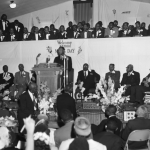By Edmond W. Davis
Special to the AFRO
Tuskegee Airmen flight instructor Roscoe D. Draper—affectionately known as “Coach”—passed away Oct. 31 at the remarkable age of 105. Draper was one of the few remaining members of the Tuskegee Airmen, and he was the only one from the Civilian Pilot Training Program of 1940. A pioneering flight instructor and American hero, he leaves a legacy that will continue inspiring generations of aviators and civil rights advocates.

Born in Haverford, Pennsylvania, during the “Red Summer” of 1919, Draper’s life was marked by courage, resilience and groundbreaking contributions that forever transformed our nation’s history.
How do you help in the effort to defeat Nazi Germany only to return home to work at the post office due to racial segregation? This was the reality faced by Roscoe Draper and countless others in the 1940s.
But now we can learn from the extraordinary life of Draper, whose dedication broke racial barriers and set new standards in American aviation. As one of the last surviving members of the first class of the Civilian Pilot Training Program (CPTP), Coach Draper was a flight instructor for over 900 Tuskegee Airmen pilots, including the famed Red Tails of World War II. Like Booker T. Washington, Draper studied at the Hampton Institute (now Hampton University) and, after earning his private pilot credentials, was selected for training at the Tuskegee Institute, where he would help reshape American and global history.
Draper began his flight training in 1940 at Kennedy & Moton Fields in Tuskegee, Alabama, laying the foundation for Black aviators in the U.S. Army Air Corps. His students included Arkansas native Jerry T. Hodges Jr., one of the 477th Bombardment Group pilots.

Draper’s impact on aviation and civil rights extended over decades. In 2007, he was awarded the Presidential Medal of Freedom by President George W. Bush—a fitting tribute to his monumental contributions to military aviation.
Draper wasn’t the only “combat-less” member of the U.S. government’s mission at Tuskegee Institute who was called a “Tuskegee Airmen.” Other Tuskegee Airmen who played pivotal roles, though they never saw combat, included groundskeepers, nurses, mess-hall workers and flight instructors. The estimated 16,000 to 19,000 Tuskegee Airmen share this historic recognition the federal government bestows.
Meeting Coach Draper in 2006 at Philadelphia’s 30th Street Amtrak Station—a location that served as my shelter two decades earlier during a period of homelessness as a child—was an unforgettable honor. The Tuskegee Airmen story became the cornerstone of my journey to preserve and share the legacy of these global heroes and “sheroes,” the Tuskegee Airmen and Airwomen. Coach Draper’s life uplifted countless aspiring aviators and forever shaped my purpose as a biographer to his friend and fellow Tuskegee Airmen flight instructor, Milton P. Crenchaw.
Draper, alongside pioneering CPTP members such as Milton P. Crenchaw, Charles R. Foxx, Daniel ‘Chappie’ James, Robert Terry, Linkwood Williams, Calvin R. Harris, Gilbert A. Cargill, Ernest Henderson, and Charles H. Flowers, under the leadership of C. Alfred ‘Chief’ Anderson and Lewis A. Jackson, laid the groundwork for what would become the Civil Rights Movement—long before Rosa Parks or Dr. Martin Luther King Jr. became household names. Their bravery and skill helped integrate the U.S. Armed Forces in 1948, inspiring generations to follow.
As one of the last of the Documented Original Tuskegee Airmen (DOTA), Roscoe D. Draper’s life represents a wealth of military, educational, and sociohistorical milestones. He will be celebrated not only by those of us who study and honor the Tuskegee Airmen but also by all who understand the profound impact of his contributions to our nation. Draper was believed to be America’s oldest surviving military pilot and federal post office employee at 105 years old.
His legacy lives on in the stories of the Tuskegee Airmen, American history, military history, and the advancements they sparked for civil rights, equality and societal equity.
The post Commentary: Mourning the loss of legendary Tuskegee Airmen instructor Roscoe D. Draper appeared first on AFRO American Newspapers.











